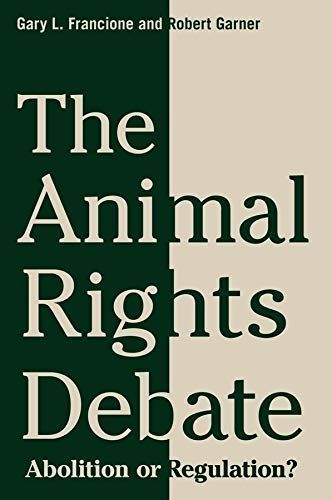
The Animal Rights Debate Abolition Or Regulation?
"The Animal Rights Debate presents the views of two preeminent thinkers working on a key debate in the study of the moral status of animalsùnamely, do animals deserve to be treated well while we use them to satisfy our needs and desires, or do animals deserve not to be used to satisfy human desires at all? This is a subject of extremely heated debate in animal studies and society at large, and Gary L. Francione and Robert Garner address it as no others can."ùGary Steiner, Bucknell University Gary L. Francione is a law professor and leading philosopher of animal rights theory. Robert Garner is a political theorist specializing in the philosophy and politics of animal protection. Francione maintains that we have no moral justification for using nonhumans and argues that because animals are propertyùor economic commoditiesùlaws or industry practices requiring "humane" treatment will, as a general matter, fail to provide any meaningful level of protection. Garner favors a version of animal rights that focuses on eliminating animal suffering and adopts a protectionist approach, maintaining that although the traditional animal-welfare ethic is philosophically flawed, it can contribute strategically to the achievement of animal rights ends. As they spar, Francione and Garner deconstruct the animal protection movement in the United States, the United Kingdom, Europe, and elsewhere, discussing the practices of such organizations as PETA, which joins with McDonald's and other animal users to "improve" the slaughter of animals. They also examine American and European laws and campaigns from both the rights and welfare perspectives, identifying weaknesses and strengths that give shape to future legislation and action. "Francione and Garner challenge each other, and their readers, to reevaluate our relations with the nonhuman. Should we seek merely to reform our present practices in farms, laboratories, zoos, and households, or should we give them up entirely? The authors debate practical and theoretical issues clearly, honestly, courteously, and with all appropriate passion. Neither persuades the other, but both together must persuade many that change is needed."ùStephen Clark associate editor, British Journal for the History of Philosophy "Francione's and Garner's positions correspond approximately with the dominant ethics underlying the American political campaigns and the British/European ones, respectively, raising the unresolved question as to which has proved the most effective. In the end, they skillfully fill in some of the gaps between areas of speciesism ethics, on the one hand, and law and politics, on the other."ùRichard Ryder author of Speciesism and Painism: A Morality for the Twenty-first Century